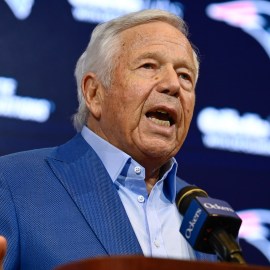For the first time since 1999, the Patriots have a head coach other than Bill Belichick.
New England on Friday hired Jerod Mayo as the successor to Belichick, who “mutually” split with the franchise Thursday. The Patriots will present Mayo as their new head coach in a press conference early next week.
The decision to quickly promote Mayo instead of conducting a full external search will be picked apart in the days and weeks ahead. But the reality is there’s no such thing as a perfect hire, and there are both positive and negative ways to spin Mayo’s ascension to leader of the franchise.
No Matchup Found
Click here to enter a different Sportradar ID.
Story continues below advertisement
With that in mind, here are three pros and three cons of the Patriots making Mayo the NFL’s youngest head coach:
PROS
He’s a players’ coach
This is undeniable. We already have one pending free agent (Mack Wilson) who’s on record as saying Mayo becoming head coach motivates him to re-sign with the Patriots. And he’s not the only pending free agent who feels that way. Patriots players love playing for Mayo, and his status as a former player — and a great one at that — carries a lot of weight. He might even be able to attract more external free agents than late-career Belichick can.
He’s like a modernized Belichick
Saying the game has passed Belichick by probably would be too strong, but there’s no denying the NFL legend was playing catch-up toward the end of his Patriots tenure. Most notably, Belichick’s approach to roster building and salary cap maneuvering became archaic. The man who revolutionized how to leverage the salary cap started to fall behind. Robert Kraft admitted as much Thursday afternoon.
“Now I think a lot of his contemporaries, younger contemporaries, have caught up with some of that,” the Patriots owner said.
Story continues below advertisement
The belief is that Mayo, who has an impressive business background and has embraced analytics, can bring the Patriots into the modern age while doubling down on some of Belichick’s evergreen principles.
Continuity can be a good thing
It’s easy to dump on the admittedly vague “Patriot Way” these days. But it would be revisionist history to suggest the culture and system of expectations instilled by Belichick didn’t factor into the Patriots’ run of dominance. It wasn’t all Tom Brady, folks. To that end, there’s something to be said for keeping things in the family while avoiding a full reset. That’s especially true if you’re among those who believe the Patriots aren’t that far away from competing, depending on how they address the quarterback position.
more patriots
CONS
He’s inexperienced
This one’s tricky, and it depends on whether you believe a playing career qualifies as coaching experience. Mayo, 37, only has five years of coaching experience, which isn’t much, but he played in New England at a high level for eight seasons.
Sean McVay, Mike McDaniel, Kyle Shanahan and Kevin O’Connell all got their first head coaching opportunity while in their 30s. However, all had at least seven years of coaching experience under their belt before they got the job. In the case of the 40-year-old McDaniel, he started his professional coaching career in 2005, three years before Mayo even was drafted.
Story continues below advertisement
Furthermore, we already know the Krafts believe this is one year too early for Mayo. Their timeline for his promotion was “expedited” by Belichick’s failures this season, according to NBC Sports Boston’s Phil Perry. The plan was for Mayo to spend another year learning under Belichick, and then get the job.
How big of a difference would that one year have made? We’ll find out.
Those damning reports exist for a reason
In December, Boston Sports Journal’s Greg Bedard reported Mayo had rubbed some in the building the “wrong way” since signing his contract extension. We now know that extension included a clause that made it clear Mayo would succeed Belichick.
The timing of the reporting certainly was curious, and you have to wonder whether some Patriots staffers had ulterior motives amid uncertain futures. But that report came from somewhere, and it eventually was corroborated.
Story continues below advertisement
To his credit, Mayo addressed the reports head-on in a recent news conference. He said the leaks were “hurtful” and triggered a period of “reflection.” He also questioned the timing and motives behind the leaks.
All indications are Mayo doesn’t have a problem winning over players. But there’s at least some reason to wonder whether he also can rally a coaching staff behind him.
Is a defense-first coach the right fit?
There’s nothing inherently wrong with having a defense-first head coach. Defense still wins championships, and the league-wide decline in scoring this season proves there still is a place in the NFL for defensive masterminds.
However, the problem, especially in today’s NFL, with not having an offense-first head coach is that you’re inviting potentially dangerous turnover at coordinator. If you have a great offensive play-caller, he probably is going to jump ship in a hurry.
Story continues below advertisement
Just ask the Buffalo Bills how things went after Brian Daboll left town. Ask Mike Vrabel how things went with the Tennessee Titans after Arthur Smith bolted. Give Dan Campbell truth serum and ask how he feels about Brian Johnson likely leaving the Detroit Lions this offseason.
All of that is fine if you have a succession plan. But can Mayo and a revamped front office replicate the offensive feeder systems we’ve seen with franchises such as the Los Angeles Rams and San Francisco 49ers? The eventual answer to that question could go a long way toward determining the long-term success of the Patriots — and whether Mayo lasts in New England.
Featured image via Bob DeChiara/USA TODAY Sports Images

















